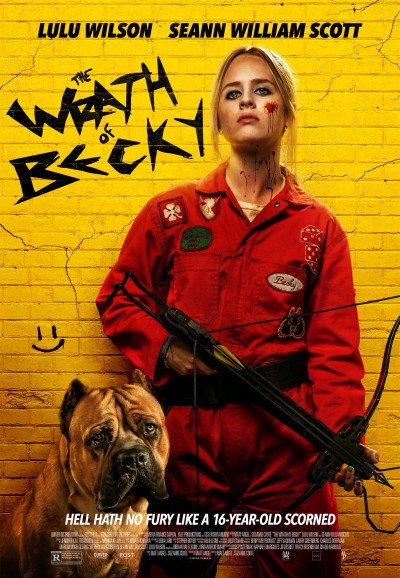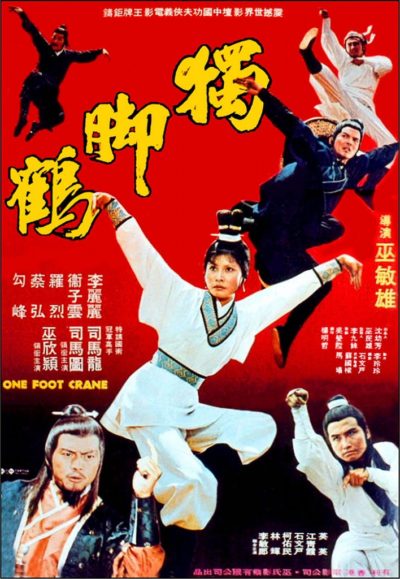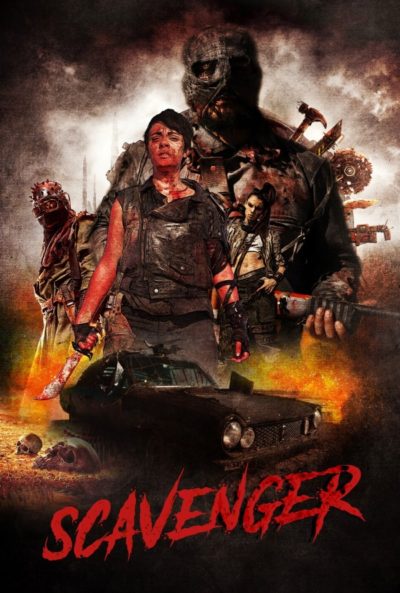 ★★★★
★★★★
“The dark side of Crocodile Dundee.”
 Here is a confession: I have never seen the acclaimed two Wolf Creek movies (2005 and 2013 – a third movie is planned). The reason was simple: I just didn’t care for ultra-cruel slashers from Australia. After watching this TV-spin off I might revise my opinion and catch up with them; if they are as good as this TV series I definitely want to see them!
Here is a confession: I have never seen the acclaimed two Wolf Creek movies (2005 and 2013 – a third movie is planned). The reason was simple: I just didn’t care for ultra-cruel slashers from Australia. After watching this TV-spin off I might revise my opinion and catch up with them; if they are as good as this TV series I definitely want to see them!
So, what’s the story? The American Thorogood family is on holiday in Australia. Unfortunately for them, their young son is swimming in a crocodile-infested lake (who goes swimming in Australia? Don’t we all know their waters are full of deadly animals?). Fortunately for them, Australian animal hunter Mick Taylor (John Jarratt) arrives, right on time, to shoot the crocodile before it can attack the boy. Unfortunately for them, Mick is a psychopathic sadistic serial killer who kills them all before the evening is over, including daughter Eve (Lucy Fry). Or so he thinks, because Eve survives. As she is slowly nursed back to health, and answers the questions of the police, she comes to the realization that the authorities won’t be able or willing to catch the killer.
She decides to hunt Mick herself and take revenge for the death of her family. Eve is originally innocent, and carries feelings of guilt, since her family was only in Australia because she was recovering from drug addiction – she used to be an athlete. She has to learn to get along in a hard, merciless country by herself, and avoid or defeat the criminals, thieves and would-be-rapists there who pose a threat during her journey. Eve is pursued by the police, as she herself has broken the law, and also by a well-meaning policeman who wants to help her. Not to mention Mick who – happily slashing his way through unpopulated areas – has realized that someone is pursuing him and starts to play a cat-and-mouse-game with Eve…
 I have to say that this series really surprised me. I had bought it based solely due to the cool cover photo and didn’t expect much more than a probably over-gruesome third-rate slasher, I mean, is Australia really famous for great serial killer psycho thrillers? Though there is the very good Stacy Keach and Jamie Lee Curtis thriller from 1981, Road Games. As a matter of fact, this short (six episodes) series blew me away with its astounding quality. When you read the above, you might be forgiven for getting the impression the whole thing will come across as a bit cheap in its storytelling, or the motivation of its characters – a bit schlocky in general.
I have to say that this series really surprised me. I had bought it based solely due to the cool cover photo and didn’t expect much more than a probably over-gruesome third-rate slasher, I mean, is Australia really famous for great serial killer psycho thrillers? Though there is the very good Stacy Keach and Jamie Lee Curtis thriller from 1981, Road Games. As a matter of fact, this short (six episodes) series blew me away with its astounding quality. When you read the above, you might be forgiven for getting the impression the whole thing will come across as a bit cheap in its storytelling, or the motivation of its characters – a bit schlocky in general.
But… it isn’t.
The best way I can describe the show is with the word “unpretentious”. That might sound strange. Yes, it is, at its core, a revenge story. And, yes, people are tortured and killed in cruel ways: when someone has an infected hand, you see him cut it off with a saw. But I never got the feeling these scenes were gratuitous or to make the blood-thirsty gorehounds happy. Quite the opposite: things like this are carefully integrated into the narrative of the story, and have a meaning that goes above mere shock value. I would almost call this story, about a serial killer tracking his prey across desert hunting grounds, decent and yes, even tasteful – considering how different this narrative could have been presented.
Most surprising for me was, though big game hunter Mick is always looming in the background, it’s mainly Eve’s story. In the beginning I wasn’t too impressed with her. She seemed like a bland, pale character, just a victim who survived a catastrophe. I was half expecting her to become the usual superwoman, who knows it all and can do everything better than every male – thanks, mister! But the filmmakers were smarter than your average Hollywood screenwriter and producer, who nowadays seem only to be able to create one-dimensional, flawless, conveyor-belt manufactured heroines. Eve does not know it all, she can not do it all alone, and makes mistakes – some really terrible. She fails and learns from it. She falls and has to stand up again. It alone makes the character better than almost 95% of today’s female protagonists in American movies or shows. Kudos for that!
Also, there is a second season, which I have not seen yet (it isn’t available in my home country). Given it has everyone’s favourite killer from Down Under again, but not Eve, I began seriously to worry about her fate. You really start to sympathize with her. Running away from the police in the beginning might be anything but rational, but as the series develops, so does she. You start to understand who she is, and she gets a backstory: she is not a random female character out for revenge anymore. She has these understandable feelings and more than once I thought: “Gosh, this could be going different, girl. You should be working together with the police. There could be common ground if you were not so stuck on the idea that you’ve got to do this all on your own!”
Then there are moments when she realizes herself she is way over her head, fighting insurmountable odds. She gets better at it, slowly, and the point in a way is about self-discovery. It becomes an odyssey for oneself, where the protagonist has to question when reaching the nadir of life: What am I standing for? Why do I do what I do? Is it really worth all that? Could I choose a different life? There are moments that indicate that Eve might give up her hunt. The series repeatedly contrasts her persona with other characters who have lost themselves, who may have been destroyed by this vast open country where you seem to be far from civilization or God.
 Eve is repeatedly confronted by these criminals, or wanna-be-rapists who see a normal dressed woman as an offer, and experiences family tragedies that actually form the core of the narrative. She is not without help though. As well as the policeman on her trail who reluctantly starts to cover-up for her, there is a criminal whom she meets in the desert, an old Aborigine who fits into the classic mentor role, a colleague in a bar and she even gets a canine companion. Though the question always lingers while watching the show: Will she get her revenge? What will she do when meeting the man who killed her family? Does she even have a chance against an experienced, sadistic killer like Mick?
Eve is repeatedly confronted by these criminals, or wanna-be-rapists who see a normal dressed woman as an offer, and experiences family tragedies that actually form the core of the narrative. She is not without help though. As well as the policeman on her trail who reluctantly starts to cover-up for her, there is a criminal whom she meets in the desert, an old Aborigine who fits into the classic mentor role, a colleague in a bar and she even gets a canine companion. Though the question always lingers while watching the show: Will she get her revenge? What will she do when meeting the man who killed her family? Does she even have a chance against an experienced, sadistic killer like Mick?
So, yes, I applaud Lucy Fry’s performance in the role. Thanks to an excellent script, it made me believe she – albeit slowly- becomes a potential threat to the seasoned serial killer. But also John Jarrat, playing this role for a third time, is incredibly good. Mick Taylor is a nightmare of a character, superficially charming, but essentially a disgusting sleazebag. Though it’s great even he has been given a backstory. While he kills the way other people drink their morning coffee, we get to know enough about him to deduce how he became that way. An episode tells us in flashback about a key event in his childhood that may have been the catalyst for his murderous doings. If this is believable is up to the viewer, I think. I like it they gave him more than the “Well, he’s insane” explanation so many movies and shows tend to give their killers nowadays.
Having Eve faced with what can only be labelled as a devil in human form, touches an even more ambitious question. It’s a theme that classic The Hitcher (C. Thomas Howell and Rutger Hauer) dared to ask. How much of your own humanity do you have to leave behind, to be able to fight the devil? I think it refers to the age-old Nietzsche-ism “If you gaze long enough into an abyss, the abyss will gaze back into you.” I’m not saying how this “psycho thriller” ends, but I really, really recommend this show. Every episode had me glued to my TV, and I got much more enjoyment out of this short Australian TV show than I imagined. Also, I think it’s far superior to your average American product playing in the same genre pool.
I really feel I should get my hands on season 2, even though the main actress won’t be back. Also, I look forward to the third movie – and I wish you happy hunting! 😉
Creator: Greg McLean
Star: Lucy Fry, John Jarratt, Dustin Clare, Jessica Tovey





 I can’t recall seeing an action heroine movie with
I can’t recall seeing an action heroine movie with  While technically solid, and occasionally looking quite good, this may be the laziest scripting I have seen in a movie for a long time. I feel I may have lost actual IQ points through the process of watching it, such is the degree of stupidity which this provides. The heroine is Mina (Black-D’Elia), a college student whose life is upended when she and her little sister narrowly escape a home invasion by Arab terrorists, in which both her parents are killed. She’s rescued by intelligence agent Olivia (Leonard), who tells her she’s the only heir of an Afghani warlord, Khalid (Arditti). Her mother betrayed him, and had to change her identity: he finally caught up with the family, and wants his daughter back.
While technically solid, and occasionally looking quite good, this may be the laziest scripting I have seen in a movie for a long time. I feel I may have lost actual IQ points through the process of watching it, such is the degree of stupidity which this provides. The heroine is Mina (Black-D’Elia), a college student whose life is upended when she and her little sister narrowly escape a home invasion by Arab terrorists, in which both her parents are killed. She’s rescued by intelligence agent Olivia (Leonard), who tells her she’s the only heir of an Afghani warlord, Khalid (Arditti). Her mother betrayed him, and had to change her identity: he finally caught up with the family, and wants his daughter back. Don’t mess with someone else’s dog. This is a good rule of thumb in most cases, but especially so when the owner is an unhinged teenage psychopath, with the both the talent and desire to inflict carnage in retribution. The
Don’t mess with someone else’s dog. This is a good rule of thumb in most cases, but especially so when the owner is an unhinged teenage psychopath, with the both the talent and desire to inflict carnage in retribution. The  Much though I love the streaming service, even I have to admit that “Tubi Originals” are a bit of a mixed bag, to put it mildly. For every
Much though I love the streaming service, even I have to admit that “Tubi Originals” are a bit of a mixed bag, to put it mildly. For every  There are times when I can look at a failure of a movie, and kinda see how the various elements could have been arranged to better effect. That’s the case here, where a poverty-row, Spanish-language (but made in Texas) production about rape, revenge and narcos, could potentially have worked. Except, it absolutely doesn’t. It’s the story of Carla Mendoza (Verastegui), who happens to be in the wrong place at the wrong time, working for her boss, Pedro Camargo (Palomo), blissfully unaware he is a cartel leader. As a result, she’s arrested, and ends up spending seven years in prison, while daughter Nina is taken care by her grandmother.
There are times when I can look at a failure of a movie, and kinda see how the various elements could have been arranged to better effect. That’s the case here, where a poverty-row, Spanish-language (but made in Texas) production about rape, revenge and narcos, could potentially have worked. Except, it absolutely doesn’t. It’s the story of Carla Mendoza (Verastegui), who happens to be in the wrong place at the wrong time, working for her boss, Pedro Camargo (Palomo), blissfully unaware he is a cartel leader. As a result, she’s arrested, and ends up spending seven years in prison, while daughter Nina is taken care by her grandmother. I never thought I’d find a film which would leave me yearning for the subtle and understated pleasures of the original I Spit on Your Grave, but here we are. 35 years on, and this cringeworthy copy was made, transplanting events to the old West. A further decade later: with a couple of re-titlings which jostle each other for inappropriateness, it’s out on a number of free movie streaming platforms. I’m here to tell you, not to bother. Even in the low-rent neighbourhood which is rape-revenge movies, you could close your eyes, pick a random entry, and be almost guaranteed to find something with a better script and general execution.
I never thought I’d find a film which would leave me yearning for the subtle and understated pleasures of the original I Spit on Your Grave, but here we are. 35 years on, and this cringeworthy copy was made, transplanting events to the old West. A further decade later: with a couple of re-titlings which jostle each other for inappropriateness, it’s out on a number of free movie streaming platforms. I’m here to tell you, not to bother. Even in the low-rent neighbourhood which is rape-revenge movies, you could close your eyes, pick a random entry, and be almost guaranteed to find something with a better script and general execution. Detective Inspector Stella Cole has her life turned upside down when her lawyer husband is killed in a hit-and-run accident, leaving her to bring up daughter Lola on her own, and struggling with an addiction to both booze and painkillers – anything to numb the pain of everyday existence. Though the driver in question is arrested, he receives a paltry sentence of only three years, and Stella begins to plot taking her own revenge. This is brought up short when the perpetrator is killed in prison, and evidence begins to accumulate that her husband’s death may not have been accidental.
Detective Inspector Stella Cole has her life turned upside down when her lawyer husband is killed in a hit-and-run accident, leaving her to bring up daughter Lola on her own, and struggling with an addiction to both booze and painkillers – anything to numb the pain of everyday existence. Though the driver in question is arrested, he receives a paltry sentence of only three years, and Stella begins to plot taking her own revenge. This is brought up short when the perpetrator is killed in prison, and evidence begins to accumulate that her husband’s death may not have been accidental. We begin with the murder of a family, with the sole (apparent) survivor being a small child, Fung Lin-yi (Li), who is able to escape. Rescued by – and stop me if you’ve heard this one before – a kung-fu master, she is rigourously trained in the titular style of martial arts. It’s fairly nifty, not least for the dagger hidden in the tip of her shoe which she uses to administer the coup de grace, Rosa Klebb style. Fifteen years later, she’s ready to seek revenge on the quartet of outlaws responsible for killing her family, who unlike our heroine, appear not to have aged a day over the decade and a half since they participated in the slaughter. Matters are complicated by a few factors. Her first victim is the father of one of the outlaws, who then starts tracking down the mysterious “One Foot Crane” responsible. There’s also a police official investigating the situation (Sze), and it turns out Lin-yi may not be the only survivor after all (Wei).
We begin with the murder of a family, with the sole (apparent) survivor being a small child, Fung Lin-yi (Li), who is able to escape. Rescued by – and stop me if you’ve heard this one before – a kung-fu master, she is rigourously trained in the titular style of martial arts. It’s fairly nifty, not least for the dagger hidden in the tip of her shoe which she uses to administer the coup de grace, Rosa Klebb style. Fifteen years later, she’s ready to seek revenge on the quartet of outlaws responsible for killing her family, who unlike our heroine, appear not to have aged a day over the decade and a half since they participated in the slaughter. Matters are complicated by a few factors. Her first victim is the father of one of the outlaws, who then starts tracking down the mysterious “One Foot Crane” responsible. There’s also a police official investigating the situation (Sze), and it turns out Lin-yi may not be the only survivor after all (Wei). This should be right up my alley. For it’s a grungy, post-apocalyptic story of revenge, which is heavy both on the carnage and the nudity. Throw in disapproving reviews containing lines like, “Downright nasty movie that takes all the worst bits of exploitation cinema and proudly puts it on display,” or “Scavenger is truly appalling,” and you’ll understand why it was fast-tracked for viewing. However, the weird thing is… those reviews aren’t wrong – it is a bad movie, just not for the reasons they espouse. The bigger problem is simply poor execution, in a way that manages to take the sex ‘n’ violence, and make it all painfully dull. Of all the cinematic sins, that’s one I find hard to forgive.
This should be right up my alley. For it’s a grungy, post-apocalyptic story of revenge, which is heavy both on the carnage and the nudity. Throw in disapproving reviews containing lines like, “Downright nasty movie that takes all the worst bits of exploitation cinema and proudly puts it on display,” or “Scavenger is truly appalling,” and you’ll understand why it was fast-tracked for viewing. However, the weird thing is… those reviews aren’t wrong – it is a bad movie, just not for the reasons they espouse. The bigger problem is simply poor execution, in a way that manages to take the sex ‘n’ violence, and make it all painfully dull. Of all the cinematic sins, that’s one I find hard to forgive.